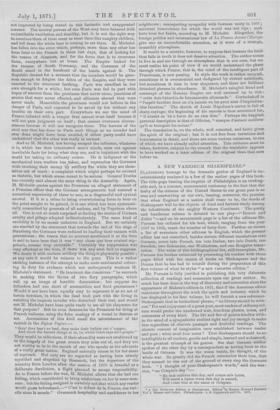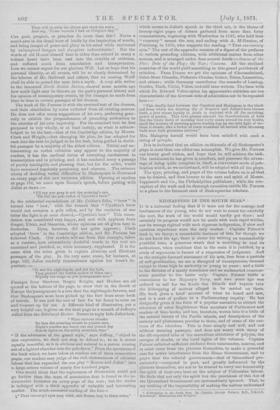A NEW VARIORUM SIIAKESPEA.RE.*
FLATTERING homage to the dramatic genius of England is un- ostentatiously rendered in a few of the earlier pages of this book. The title-page bearing the imprint of Philadelphia is an irrefrag- able and, in a manner, monumental testimony to the fact that the fealty of the citizens of the United States to our great poet is as true and unswerving as our own, bearing, moreover, the promise that when England as a nation shall cease to be, the words or Shakespeare will be the objects of fond and fervent study among- the inhabitants of the mighty Western Continent. The portly and handsome volume is devoted to one play—" Romeo and Juliet "—and on its seventeenth page is a list of the editions Mr. Furness has collated for his text, which, ranging from the year 1597 to 1865, reach the number of forty-four. Further on occurs a list of seventeen other editions in English, which the present editor has not consulted, besides sixteen different translations into• German, seven into French, ten into Italian, two into Dutch, one Swedish, two Bohemian, one Wallachian, and one Bengalee trans- lation. The value of this bibliographical list, still incomplete, Mr. Furness has further enhanced by presenting his readers with three pages filled with the names of books on Shakespeare and the Drama that he has had to consult during the preparation of this• first volume of what he styles " a new variorum edition."
Mr. Furness is fully justified in publishing this very elaborate collection of readings and comments upon our great author. So much has been done in the way of discovery and correction since the appearance of Malone's edition in 1821, that if the American editor maintains throughout the work the spirit and industry which ha has displayed in his first volume, ho will furnish a new reference- Shakespeare that in booksellers' phrase, " no library should be with- out." For real enjoyment of a great poet, most readers of ordinary cul- ture would prefer the unadorned text, free from glosses, notes, and comments of every kind. The life and fire of genius kindles with- in the mind of a sympathetic student light and joy enough to make. him regardless of obscure passages and doubtful readings. The electric current of imagination once established between reader and poet ; what avail foot notes ? That Shakespeare should be so- intelligible to all readers, gentle and simple, learned and unlearned, is the greatest triumph of his genius. See that German soldier spoken of the other day by a correspondent as having been at the battle of Orleans. It was the worst battle, he thought, of the whole war. So greatly did the French outnumber their foes, that they seemed to rise out of the ground at every step the Germans. took. " I thought of your Shakespeare's words," said the war- rior, "on Crispin's day ":-
"He that outlives this day, and comes safe home, Will stand a tiptoe when this day is named, And rouse him at the name of Orispian.
* A New Variorum Edition of Shakespeare. Edited \by Horace Howard Fume**. Vol. I. Romeo and Juliet. Philadelphia : J. B. Lippincott and 170. 1871. Then will he strip his sleeve and show his scars, And say, These wounds I had on Crispin's day.'"
Can poet, prophet, or preacher do more than this? Nerve a man's arm in the dread hour of battle by the inspiration of words, and bring images of peace and glory to his mind while environed by unimagined dangers and slaughter indescribable But the words of old Homer himself that iu olden time echoed in many a valiant heart have been cast into the crucible of criticism, and suffered much from emendation and interpretation. Less we cannot expect for our glorious Will. Let us hope that his personal identity, at all events, will be so clearly determined by the laboura of Mr. Ilalliwell and others, that no coining Wolff
shall be able to pound the man into a myth. A very able writer in the lamented North British Review, showed some months ago
bow much light may be thrown on the poet's personal history and his opinion of contemporary events, by the changes he made from time to time in certain passages of his dramas.
The work of Mr. Furness is with the received text of the dramas, and their elucidation by notes collected from all existing sources. He does not offer many suggestions of his own, preferring gene- rally to exhibit the preponderance of preceding authorities to the exercise of his own ingenuity. For his standard text he first purposed to rely wholly, or at least mainly, on what is acknow- ledged to be the best—that of the Cambridge edition, by Messrs. Clark and Wright,—but changing his plau, he has adopted for each line the text he judged to be the best, being guided in doubt- ful passages by a majority of the ablest editors. Trivial and un- interesting as verbal criticism may appear to the majority of readers, it has the cardinal virtue of correcting carelessness iu transcription and in printing, and it has rendered many a passage of poetry intelligible and pleasing that, but for the critic, would have remained hopelessly perplexing and obscure. The extreme nicety of deciding verbal dIffieultieti In Shakespeare is illustrated on every page of this uew variorum edition. Opening at random at page 192, we coin() upon Romeo's speech, before parting with Juliet at dawn
say you grey is not tho morning's eye,
'Tie but the pale reflex of Cynthia's brow."
in the celebrated emendations of Mr. Collier's folio, " brow " is turned into " bow," with the remark that " Cynthia's brow would not occasion a pale reflex, and by the omission of oue letter the light is at once cleared,—Cynthia's bow." This emen- dation was considered very happy, and met with applause from Singer, 'Ariel, and Staunton, whose opinions are all given here in
footnotes. Dyce, however, did not quite approve ; Clark adopted brow' in the Cambridge edition, and Mr. Furness has followed Clark. Our readers will see from this example, taken at a venture, how exhaustively doubtful words in the text are examined and justified, or, when necessary, supplanted. It is the same with the notes given to explain allusions and illustrate passages of the play. In the very same scene, for instance, at page 190, Juliet tenderly remonstrates against her lover's de- parture : -
"It was the nightingale, and not the lark,
That pierced the fearful hollow of thine oar ; Nightly she sings on you pomegranate tree."
Passages from Steeveus, Singer, Knight, and Hudson are all quoted at the bottom of the page, to show that in the South of Europe the:pomegranate is a tree that the nightingale favours, and that Shakespeare must have picked up the fact from some book of travels. It was just the sort of fact for his fancy to seize on and treasure up for use. A different kind of illustration, yet a very helpful one, is given on the next page in a remark of Jeffrey's culled from the Edinburgh Review. Romeo in reply bids Juliet look,
" What envious streaks Do lace the severing clouds in yonder east, Night's candles are burnt out and jocund day Stands tiptoe on the misty mountain-tops."
'4 If the advocates of the grand style," says Jeffrey, " object to this expression, we shall not stop to defend it ; to us it seems equally beautiful, as it is obvious and natural to a person coming
out of a lighted chamber into the pale dawn." From the specimens of the book which we have taken at random out of three consecutive pages, our readers may judge of the rich elaborateness of editorial labour that has expanded the one play " Romeo and Juliet" into a large octavo volume of nearly five hundred pages.
One would think that the copiousness of illustration could not go farther than the mass of annotation that is found in the in- numerable footnotes on every page of the text ; but the reader is indulged with a thick appendix of valuable and interesting matter. The much-contested reading of the line—.
L" That runaway's eyes may wink, and Romeo leap to these arms," which occurs in Juliet's speech in the third act, is the theme of twenty-eight pages of debuts gathered from more than forty commentators, beginning with Warburton in 1747, who held that " runaway " meant the sun, and ending with A. M'Ilwaine, of Pittsburg, in 1869, who suggests the reading " That sun-aweary eyes." The rest of the appendix consists of a digest of the prefaces to various preceding editions, with additional matter from other sources, and is arranged under four several heads :—Source of the Plot ; Date of the Play ; the Text ; Costume. All the civilized countries of the world yield something to this grand patchwork of criticism. From France we get the opinions of Chateaubriand, Saint-Marc Girardin, Philareto Chasles, Guizot, Taine, Lamartiue, and others ; while Germany contributes the remarks of Leasing, Goethe, Tieck, Ulrici, Vehse, and still later writers. The lines with which Dr. Edward Vehse opens his appreciative criticism are too characteristic of the German note of admiration not to be repeated here:— "This deadly feud between the Capulots and Montagues is the black soil from which the dazzling lily of Romeo's and Juliet's love blooms forth, a love whose loyalty in death is depicted with all the ravishing power of poetry. This love gleams athwart the thunderclouds of hats like the lovely dawn of morning that coyly sends abroad its rosy beams, amid the horrors of yawning graves freshly dug by the wild fight of fac- tions it stands, like a bower of roses wreathed all around with blooming buds near dark gruesome caverns."
Mrs. Malaprop herself would have been satisfied with such a string of epitaphs.
his to be feared that an edition on this scale of all Shakespeare's plays is more than one editor can accomplish. We give Mr. Furness our hearty good wishes, and hope that he will achieve the task. The instalment he has given is excellent, and possesses the advan- tage of being quite complete in itself,.a convenient mode of pub- lication which, as we understand, will be adopted with all the plays.
The typo, printing, and paper of the volume before us is all that can bo desired, and does honour to the care and spirit of Messrs. Lippincott and Co., the Philadelphian publishers ; while the con- ception of the work and its thorough execution entitle Mr. Furness to a place iu the foremost rank of Shakespearian scholars.



































 Previous page
Previous page